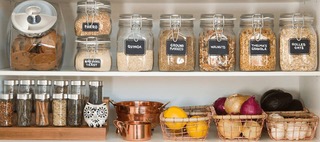The high cost of pre-packaged foods
By Verity Noble
Even as an ardent zero-waster, if I go to a mainstream store (let’s say Wholefoods) there’s no way I can walk out of the door after my weekly shop without at least half a bins worth of plastic crap that will go into landfill.
And the average American actually produces 1,704 pounds of trash each year. That’s enough to fill 23 million garbage trucks, which is 50 garbage trucks per minute!
Before we pat ourselves on the back for our awesome recycling habits here in Colorado, only 12% of our waste gets recycled, which is well under the national average of 35%.
But the waste isn’t the only issue with packaging.
There are two big secrets that could change the way you look at packaged foods forever.
First, a lot of food packaging contains toxic chemicals that leech into our food. You’d assume the FDA or some other body would regulate against this, right? Wrong. The regulations are loose and generally left to food companies to decide for themselves.
Secondly, packaged food is often at least twice as expensive as non-packaged (bulk) food.
Let’s dive in a little more…
Toxic Packaging:
4,000-6,000 chemicals are used in food packaging. Very few of these have gone through any kind of rigorous testing but for those that have, 175 of them are “either known or suspected endocrine disruptors, or exhibit carcinogenic, mutagenic, or reproductive toxicity.”
I am totally overwhelmed by all the long, crazy names of these packaging chemicals so I am going to leave them out here, but just to be clear, they’ve been linked to a laundry list of illnesses and ailments including: breast, kidney, testicular, prostate, and other cancers, estrogenicity, inhibition of natural hormones, impaired fetal and sexual development, infertility, diminished libido, immunotoxicity, thyroid disturbance, diabetes, obesity, cardiac toxicity, liver damage, low birth weight, pulmonary effects such as asthma, impairment of neurological development in the fetal and infant brain, and thyroid function.
“Low doses of these chemicals may be as impactful as high doses of exposure.” said Leonardo Trasande, pediatrician and author of ‘Sicker, Fatter, Poorer: The Urgent Threat of Hormone-Disrupting Chemicals to Our Health and Our Future and What We Can Do About It.’ “Even the lowest level of exposure can cause serious, permanent and lifelong consequences as a result of these preventable exposures.” So what’s the alternative? He suggests drinks and food items packaged in glass, or fruits and vegetables that are not packaged at all.
Crazy Pricing:
Picking up a box/tin/bag of food is super easy, I know. But the time you save by doing this, rather than going to the bulk bins, may actually be costing you money.
Let’s compare a few favorites from Whole Foods:
Oats – the most popular of household staples costs a palatable $1.69 per pound in the bulk section. Put it in packaging and it jumps up to $5.32 a pound. If you put it in even more packaging (box of individual servings) it goes up to $15.94 a pound! And if you decide you like the fancy stuff in a plastic bag, that’ll set you back $9.47 a pound.
So if it takes you an extra 2 minutes to fill up at the bulk station and you’re buying 2 pounds, even if you buy the cheapest packaged oats, you’re saving $7.26. If you extrapolate that out to an hourly rate, that is the equivalent of $217.80 an hour that you’re in essence ‘earning’ by taking 2 minutes to go to the bulk bins.
And just so you know, oats aren’t some crazy anomaly. Raisins are $2.99 a pound in bulk, $5.32 a pound packaged and $15.94 a pound if you buy a package of mini boxes.
And then there’s Nutritional Yeast; $6.99 in bulk and $22.38 a pound packaged! That is one expensive plastic tub.
But you’re busy, I get it …
Even though we’re:
- Drowning the world in plastic (the oceans are forecasted to have more plastic than fish by 2050)
- Killing ourselves slowly with all the chemicals in packaging (known cancer-causing BPA has been found in 92% of children and adults in the United States)
- Paying at least twice as much for packaged goods as we would for those without packaging
We often don’t have the time to check all the packaging labels, to fill our bulk containers and to source unpackaged, organic fresh vegetables.
So, what’s the solution?
- Subscribe to Nude Foods Market. I’m one of a 50% female team launching this new zero-waste grocery delivery service. Nude Foods Market is a bulk food concept out of Boulder. You can subscribe to any or all of the following:
– Fresh Produce Box (fruits and veggies)
– Pantry Staples Box (nuts, seeds, oils, flours – rotated each week)
– Local Bites Box (granola, pasta, sauces, seasonings, popcorn, bread)
– Pimp my Pantry Box (all the pantry staples you need to get started)
- Join a Community Sourced Agriculture group where you share in what a farm produces, receiving fresh vegetables every week. Usually you go and pick them up from the farm yourself or from a central location.
- Shop in the bulk section of the grocery store. Unfortunately, their selections are pretty limited but you could significantly reduce your packaging ‘intake.’
*Nude Foods Market delivers by bike to your door or you can pick up in a central location every week if outside Boulder. All items (except fruit and veggies) come in glass mason jars sanitized in our fully licensed commercial kitchen.
Verity Noble is a passionate zero-waster, vegan, environmentalist, and impact investor in Nude Foods Market. Join the revolution at www.nudefoodsmarket.com.


This is an awesome idea!
Sorry it is only available in Boulder.